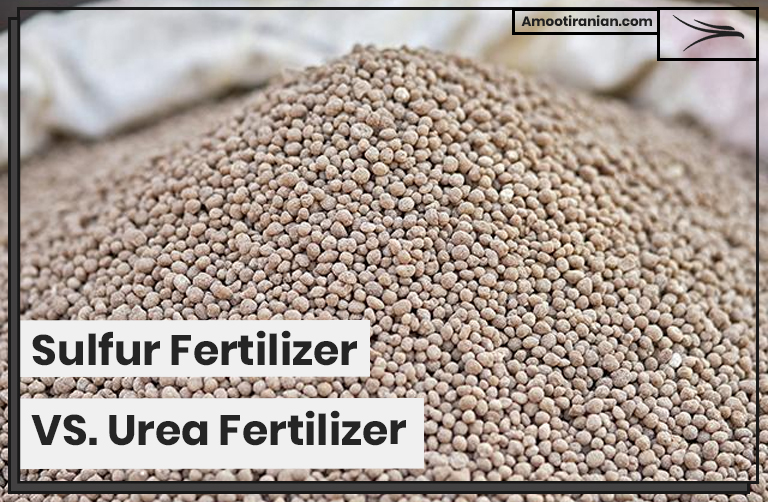Sulfur and urea fertilizers are both important for plant growth and are used to supplement the soil’s nutrients.
However, they differ in their chemical composition and the way they affect plant growth.
.

.
Sulfur Fertilizer
What Is Sulfur Fertilizer?
Sulfur is an essential nutrient that is important for the growth and development of plants. Sulfur is needed to form amino acids, which are the building blocks of proteins.
.

.
Sulfur also plays a role in the formation of chlorophyll, which is necessary for photosynthesis.
Sulfur fertilizers provide plants with a source of sulfur. These fertilizers are usually in the form of elemental sulfur or sulfate compounds.
Elemental sulfur must first be converted into sulfate by soil bacteria before plants can use it. Sulfate compounds such as ammonium sulfate, calcium sulfate, and potassium sulfate are more readily available to plants.
.
Benefits of Sulfur Fertilizer
- Promotes plant growth and development
- Enhances plant resistance to stress and disease
- Improves the quality and quantity of crops
- Helps to maintain soil pH
.
Urea Fertilizer
.

.
What Is Urea Fertilizer?
Urea is a nitrogen-based fertilizer that is widely used in agriculture. Urea is a white crystalline solid that contains 46 percent nitrogen. Nitrogen is an essential nutrient that is necessary for the growth and development of plants. Urea is a readily available source of nitrogen that can be quickly absorbed by plants.
Use urea in moderation and follow sustainable agriculture practices to minimize its impact on the environment.
One way to reduce the amount of urea needed for crop growth is to use precision agriculture techniques such as soil testing, which can help determine the appropriate amount of fertilizer needed for specific crops and soil types. Another approach is to use alternative nitrogen sources such as compost, manure, or other organic fertilizers, which can also provide other beneficial nutrients to the soil.
Additionally, incorporating cover crops or rotating crops can help reduce the need for nitrogen fertilizers, as they can help fix nitrogen from the atmosphere into the soil. Overall, while urea is a valuable fertilizer, its use must be balanced with environmental concerns and sustainable agriculture practices.
.
Benefits of Urea Fertilizer
- Provides plants with a source of nitrogen
- Enhances plant growth and development
- Increases crop yield and quality
- Improves soil fertility
- Easy to handle and store
.
Comparison
Sulfur and urea fertilizers differ in their chemical composition and the way they affect plant growth.
While sulfur provides plants with sulfur, which is important for the formation of amino acids and chlorophyll, urea provides plants with nitrogen, which is essential for the growth and development of plants.
Additionally, sulfur fertilizers may help to improve soil pH, while urea fertilizers may improve soil fertility. Ultimately, the choice between sulfur and urea fertilizers depends on the specific needs of the plants and the soil.
.
Here’s a list of the differences between sulfur and urea fertilizers:
.
| Chemical composition | Sulfur fertilizers provide plants with sulfur, while urea fertilizers provide plants with nitrogen. |
| Plant growth | Sulfur is important for the formation of amino acids and chlorophyll, while nitrogen is essential for the growth and development of plants. |
| Soil pH | Sulfur fertilizers may help to improve soil PH. |
| Soil fertility | Urea fertilizers may improve soil fertility. |
| Choice | The decision to use sulfur or urea fertilizers depends on the specific needs of the plants and the soil. |
.
What Is Sulfur Coated Urea And Its Advantages
.

.
Sulfur-coated urea (SCU) is a type of controlled-release nitrogen fertilizer that consists of urea granules coated with a layer of elemental sulfur.
The coating slowly releases nitrogen into the soil as it is gradually broken down by soil microbes, providing a more consistent supply of nitrogen to plants over an extended period of time.
.
One of the primary advantages of SCU is that it reduces the risk of nitrogen leaching and volatilization, which can occur when conventional urea fertilizers are applied.
This is because the sulfur coating helps to slow down the release of nitrogen, allowing it to remain in the soil for longer periods and reducing the potential for runoff or loss due to evaporation.
Another benefit of SCU is that it can improve the efficiency of nitrogen uptake by plants, leading to improved crop yield and quality.
This is because the slow release of nitrogen from the sulfur-coated granules matches the uptake rate of the plants, reducing the risk of nitrogen being lost to the environment or becoming unavailable to the crops.
.
Overall, sulfur-coated urea can be a beneficial fertilizer option for farmers who want to improve nitrogen use efficiency, reduce environmental impacts, and promote sustainable agricultural practices.
